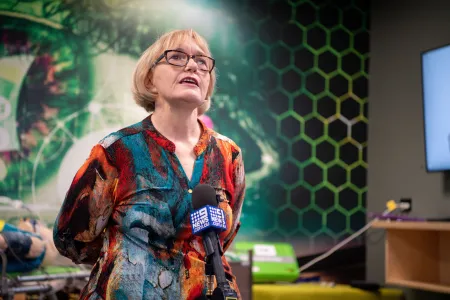News
Health response to disasters in the spotlight
Our national response to natural and manmade disasters will be in the spotlight at a public lecture to be held at Charles Darwin University (CDU) today.
The CDU Menzies Medical School’s Foundation Dean, Professor Dianne Stephens, will talk about a coordinated and planned response to health emergencies, such as what we have experienced during COVID-19.
Darwin is home to the National Critical Care and Trauma Response (NCCTRC) which provides health emergency response through education, training and the deployment of the Australian Medical Assistance Team.
As the Medical Director at the NCCTRC, Professor Stephens led the organisation to ACHS accreditation and an ACHS Global Innovation Award.
Professor Stephens leads the academic and research partnerships portfolio for the NCCTRC, including the development of postgraduate courses in aeromedical retrieval and health emergency preparedness at CDU.
In her lecture, she will talk about the role of the NCCTRC in health emergency responses and share stories from the field.
“The NCCTRC is based right here in Darwin and is a national and global leader in health emergency preparedness and response and it all started with our Royal Darwin Hospital response to the victims of the bombing in Bali in October 2002,” Professor Stephens said.
“It is an important story for me to share with the NT community in the year that marks the 20th Anniversary of an event that touched the lives of many in our community.”
As the Northern Territory is no stranger to natural disasters, it is also particularly important to increase the community’s preparedness for such weather events.
“The Territory is prone to natural disasters like cyclones and extreme weather events. It is also home to the NCCTRC headquarters, so it’s important for the Darwin community to understand we have a global leader in health emergency response and preparedness,” Professor Stephens said.
“The NCCTRC plays a key role in responding to both national and international disasters, including the response to the COVID-19 pandemic both in Australia and in our region.”
“It has contributed to the deployment, training and capacity building in our regions for disasters.”
The public lecture is part of a series that features leading academics’ expert insight into health topics such as the use of technology in medical education, psychology in the medical curricula and disaster mitigation.
The lecture is free and open to the public. It will be held at the Mal Nairn Auditorium at CDU’s Casuarina Campus from 5.45 pm on Tuesday, May 10.
More information and to register head to: https://www.cdu.edu.au/events/dont-panic-its-disaster
Related Articles

First “hype cycle” of AI development put tech above humans
Users around the world have rushed to adopt artificial intelligence - especially in safety-critical fields - but a new study has revealed the hype has prioritised technology for technology’s sake instead of human-centred development.
Read more about First “hype cycle” of AI development put tech above humans
Nanoplastics hindering cognitive abilities of fish, international research shows
Nanoplastic exposure can impair the cognitive abilities of fish and could lead to significant impacts on marine species’ ability to survive, according to a new international study.
Read more about Nanoplastics hindering cognitive abilities of fish, international research shows
New project to grow Indigenous aquaculture on one of Australia’s largest islands
An Australian island’s efforts to improve food security and transition into a blue economy will be bolstered by a new project to propagate a nutritious and increasingly popular fish.
Read more about New project to grow Indigenous aquaculture on one of Australia’s largest islands
